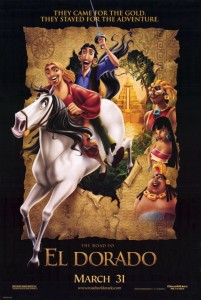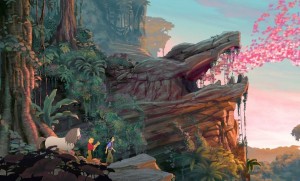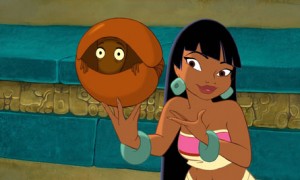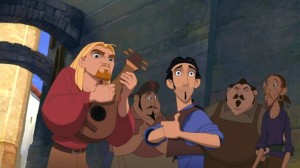100 Film Favorites – #67: The Road to El Dorado
(Eric “Bibo” Bergeron & Will Finn, 2000)
 Sometimes Disney and Dreamworks release films with very similar subject matter at roughly the same time, and you have to wonder what’s up. A Bug’s Life and Antz. Finding Nemo and Fish Tale. Madagascar and The Wild. And though they aren’t always grouped in with those others, I would argue that the same is true of Atlantis: The Lost Empire and today’s entry, The Road to El Dorado. Released within roughly a year of each other, both films deal with an expedition to locate a legendary lost land. As I mentioned yesterday, both films rank on this list because they appeal to my interest in cryptozoology and other fields relating to the investigation of legend. But not only did Dreamworks get their entry in first; they made the better movie.
Sometimes Disney and Dreamworks release films with very similar subject matter at roughly the same time, and you have to wonder what’s up. A Bug’s Life and Antz. Finding Nemo and Fish Tale. Madagascar and The Wild. And though they aren’t always grouped in with those others, I would argue that the same is true of Atlantis: The Lost Empire and today’s entry, The Road to El Dorado. Released within roughly a year of each other, both films deal with an expedition to locate a legendary lost land. As I mentioned yesterday, both films rank on this list because they appeal to my interest in cryptozoology and other fields relating to the investigation of legend. But not only did Dreamworks get their entry in first; they made the better movie.
“The Road to El Dorado” begins in 16th century Spain, when Miguel and Tulio, two fast-talking con men, hide out in barrels to evade a group of gamblers they’ve cheated in a game of dice. Unbeknownst to Miguel and Tulio, the barrels are loaded onto the ship of Hernan Cortes, and soon the two are stowaways bound for the New World. After escaping the ship with a rowboat (and Cortes’ own horse), Miguel and Tulio make it to shore and begin following the directions on a mysterious map they just happen to have won in their recent dice game. The duo treks through the South American jungle, past a series of landmarks indicated on the map, before ultimately arriving in El Dorado, the legendary city of gold. Here, the two men are worshiped as gods for resembling a temple carving of two deities riding a horse-like creature.
Though most of El Dorado’s citizens accept the Spaniards’ divinity without question, the high priest, Tzekel-Kan, has doubts, particularly when Miguel and Tulio turn down the offer of a human sacrifice. The priest sees little similarity between these “gods” and the vicious, sacrifice-demanding kind of deity more customary among the Aztecs and Mayans. In order to prove their godhood, Tzekel-Kan says, Miguel and Tulio must defeat the city’s most skilled players of the Mesoamerican ball game (kind of like ancient, sideways basketball, or hacky-sack with a hoop). Finding themselves outmatched, the duo resort to their old, reliable tactic of cheating. They swap the ball with an armadillo, which crawls through the hoop when they need it to, and skitters around whenever the other team attempts to score. Victorious, the “gods” banish Tzekel-Kan from the city.
Seeing that a scratch Miguel received during the game is bleeding, Tzekel-Kan finally has proof of Miguel and Tulio’s mortality, and sics a giant, mechanical jaguar on the pair (another similarity with Atlantis – giant mechanical animals. Where do these ancient cultures keep getting them?). Miguel and Tulio manage to knock the evil priest and his robo-cat off a cliff and into a large whirl pool, which sucks them down and expels them from the city.
Tulio makes ready to “return to the sky,” departing the city with a fortune in gold and his new El Doradian girlfriend, Chel (yet another “Atlantis” commonality – bikini-clad native love interests with four-letter names). However, Miguel desires to remain in the city, having discovered an appreciation for the place’s tranquility and natural beauty. This plan doesn’t last long, however, because the “gods” see smoke on the horizon and realize that Tzekel-Kan is leading Cortes, whose brutal, imperialistic manner is more in keeping with the priest’s definition of a god, back to the city. Miguel, Tulio, and Chel rush to exit El Dorado as the natives fell a great statue to block the waterfall entry to the city. The trio make it back through the entryway before the statue comes crashing down, but their treasure ship is capsized and sinks. Tzekel-Kan leads Cortes to the waterfall, behind which is now just a wall of broken boulders. The furious Cortes hauls the disgraced priest away, presumably into slavery. How droll!
Having lost their treasure, Miguel, Tulio, and Chel head for the horizon, not noticing that their horse still wears the golden shoes he received in El Dorado.
It’s interesting to note that The Road to El Dorado was only Dreamworks’ second feature done in “traditional” 2-D animation, after the biblical epic The Prince of Egypt. The studio would only make two more films in the medium before the massive success of Shrek and Shrek 2 prompted a switch to only making computer-animated features.
Now, since I’m sure you’re all wondering, here’s a few reasons that El Dorado edges out Atlantis for a higher ranking:
1. Smaller cast. Instead of a massive crew, our heroes are just two rough-and-tumble dudes. The small cast allows time for plenty of witty banter and funny moments.
2. One of those dudes, Miguel, is voiced by Kenneth Branagh. That man is Hamlet AND Gilderoy Lockhart. You can’t beat that.
3. Songs by Elton John and Tim Rice, and a score composed by Hans Zimmer. The same three men created the music for The Lion King. While none of the songs is the next Hakuna Matata, The Trail We Blaze is pretty darn good.
4. It gave us the following excellent .gif:
Brian Terrill is the host of television show Count Gauntly’s Horrors from the Public Domain. You can keep up with Brian’s 100 Film Favorites countdown here.










